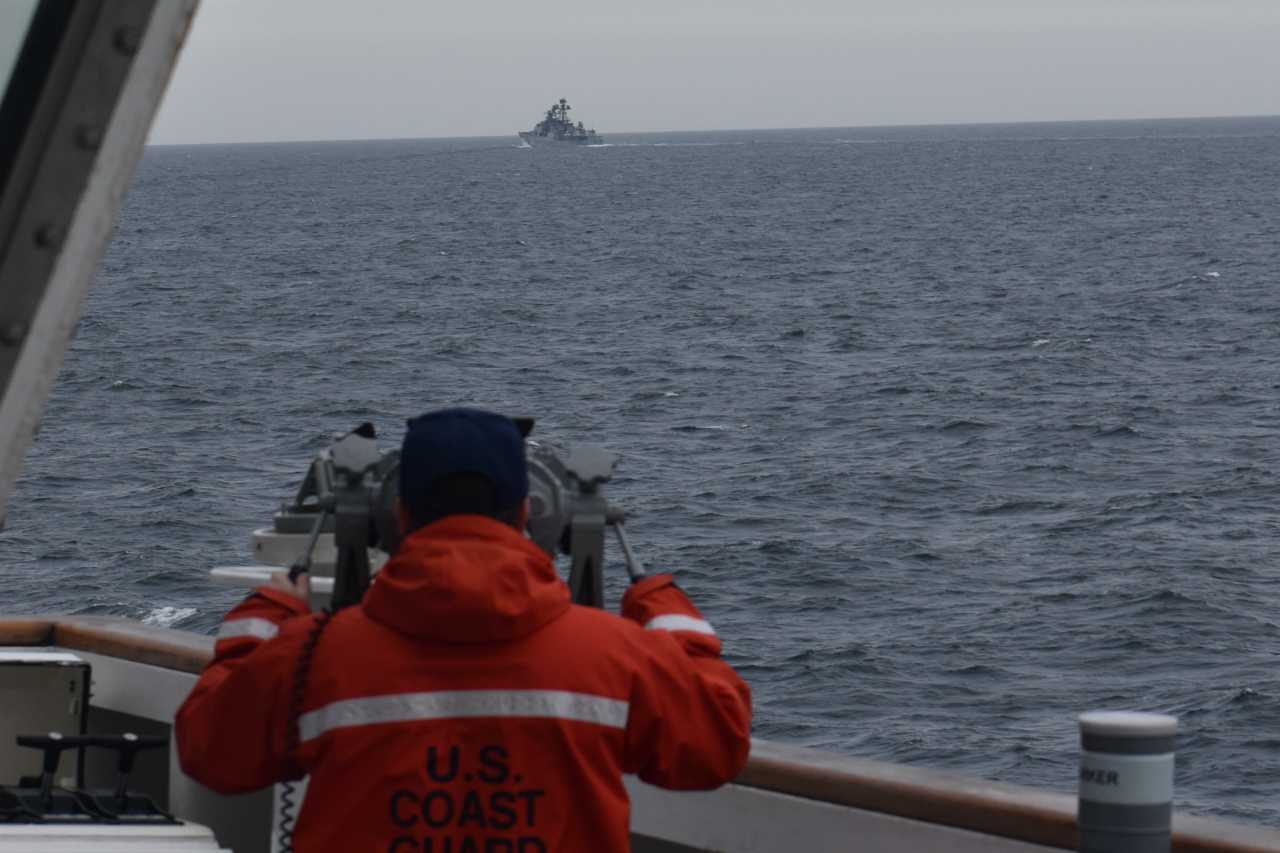A U.S. Coast Guard ship unexpectedly encountered Chinese and Russian warships off Alaska
The joint activity could signify closer military cooperation in the Arctic between Russia and China.

A U.S. Coast Guard vessel on a routine patrol in the Bering Sea waters off Alaska earlier this month unexpectedly encountered Chinese and Russian warships operating together in formation, the service announced on Monday.
The naval activity comes at a time when Russia seeks to strengthen ties with China and to project force after recent setbacks in Ukraine, and as China develops its naval capabilities. It also comes on the heels of several other Russian military exercises in the Arctic, including in the Chukchi Sea and along the Taymyr Peninsula.
The U.S. Coast Guard Cutter Kimball was on patrol in the region when it spotted a Chinese guided missile cruiser about 75 nautical miles north of Alaska’s Kiska Island, one of the westernmost islands in the Aleutian chain, the Coast Guard said in a release.
[Russia shows off Arctic military power]
The crew later spotted six additional vessels — two more ships from China’s People’s Liberation Army Navy and four Russian Navy ships, including a destroyer — sailing together with the missile cruiser within the U.S. exclusive economic zone.
The Kimball crew eventually observed the “combined surface action group” disperse, according to the Coast Guard.
The formation “operated in accordance with international rules and norms,” Rear Adm. Nathan Moore, the Alaska district’s commander, said in the release, but added that the service will “meet presence-with-presence to ensure there are no disruptions to U.S. interests in the maritime environment around Alaska.”
The encounter triggered a Coast Guard response, dubbed Operation Frontier Sentinel, which is designed to project U.S. presence when so-called “strategic competitors” (such Russia or China) are active near U.S. waters, and involved air support from the Coast Guard’s base in Kodiak.
[Russia conducts Chukchi Sea military drills]
Russian and Chinese military cooperation in the Arctic could mark an notable shift in the regional security picture, experts said.
“Russian forces are largely tied up in Ukraine, but since the invasion, the Kremlin has doubled down on language identifying the Arctic as a region of the utmost national importance,” Marisol Maddox, a senior Arctic analyst at the Wilson Center’s Polar Institute, said in an email to ArcticToday.
A new Russia naval doctrine announced in August emphasized the Arctic Ocean’s importance to the country.
The joint formation is a “power projection move” that shows China is willing to cooperate with the Russian military publicly “and creates strategic ambiguity about the extent to which that relationship may extend,” Maddox said.
China’s engagement with Russia, despite the country’s continuing invasion of Ukraine, “speaks to the degree to which relations have deteriorated between China and the U.S.” — and to the West broadly, Maddox said.
Russia has been cautious about military cooperation with China in the Arctic in the past, she said.
“As Russia pivots towards Asia to keep its economy alive amidst harsh sanctions, they are more likely to make concessions to China that they would not ordinarily be comfortable with; further military engagement with China in the high latitudes is one of those areas to watch.”
The Coast Guard also unexpectedly encountered Chinese warships conducting military and surveillance operations near the Aleutian Islands in August 2021.
“With the new Russian naval doctrine in effect and China working to develop blue-water navy capabilities, it is increasingly necessary to provide U.S. and allied presence in the maritime domain,” Troy Bouffard, director of the Center for Arctic Security and Resilience at University of Alaska Fairbanks, said in an email to ArcticToday.
Unexpected exercises in the U.S. exclusive economic zones show the importance of U.S. military presence in the North, Bouffard said.
“It’s important to be physically present too, even for deterrence purposes, because although many things can effectively act as a deterrent, a virtual presence equals an actual absence.”